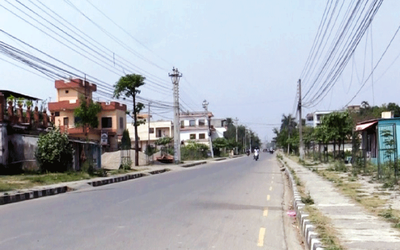Amid off-and-on allegations about corruption and bureaucratic delays in dispensing funds to foreign countries, External Affairs Minister S.M. Krishna has initiated a host of steps, including the setting up of a central aid agency, to inject greater transparency and swiftness in delivery systems.
"We believe in providing total transparency in all our operations. It's a fact that in the last four-five years India has emerged as one of the big donors among developing countries for less developed and smaller countries," Krishna told reporter in an interview aboard his special aircraft as he flew back from Beijing to Bangalore.
"We have worked out a system to ensure transparency and will not be found wanting," he replied when asked about the oft-iterated allegations of funds diversion and delays in delivery of aid.
The authorities in Bangladesh, for example, have often complained that the implementation of projects under the USD 1 billion line of credit provided by India over two years ago has been slow. But India has maintained that the nature and magnitude of those projects take time.
"Till now, our aid budget has been small. However, it's been growing for some time. Prime Minister Manmohan Singh announced USD 5 billion for Africa at the second India-Africa Forum Summit in Addis Ababa last year," he said.
Amid China's aggressive diplomatic outreach in the developing world, India has scaled up aid and soft loans of over USD 11 billion to developing countries as part of its long-term strategy to push India's strategic interests through economic diplomacy and soft power projection.
The foreign aid, which India likes to call developmental assistance, includes USD 7.5 billion to Africa, USD 2 billion to Afghanistan, USD 1 billion to Afghanistan, USD 1 billion to Myanmar and substantial aid to neighbouring countries like Nepal, Bhutan, Sri Lanka and the Maldives.
"It's one of our key priorities to provide a structural framework for dispensing aid. All aid is now being channelised through the Development Partnership Administration (DPA)," Krishna said. The DPA was set up in January in a bid to enhance India's soft power and economic diplomacy through swifter aid delivery.
Krishna said the DPA's strength will be doubled over the next six months in view of the need to fast-track commitments made by India to various countries.
The DPA currently comprises around 20 officials who also include professionals from other countries and brings under one umbrella all aspects related to project implementation, ranging from monitoring implementation and auditing impact assessment.
Experts from other ministries, including the railways, telecommunications, agriculture and human resource development, are being brought on deputation into the DPA'a fold. Experts also join from outside the government as consultants on a project-to-project basis.
Although the DPA, a department of the external affairs ministry, was set up in January, it acquired traction only after the BRICS summit of emerging powers in March-end. The DPA is headed by P.S. Raghavan, additional secretary in the external affairs ministry.
Underlining the need for probity, Krishna also stressed that he wants to keep the ministry's operations and activities above board. "That's why in all projects related to the ministry, we have an open tendering system so that we can get the best service provider for a particular project. These contracts are not done through nomination," he said.
With more countries supporting New Delhi's quest for a permanent seat in the UN Security Council and its global profile growing, India will expand its woefully understaffed foreign service by opening doors to more experts and step up its diplomatic outreach around the world, said Krishna.
He said, "Our global profile has been steadily growing. We have conducted our diplomacy effectively as a responsible (non-permanent) member of the UN Security Council. We have been very responsible and restrained."
"We haven't been subjective; we have been objective in taking stand on leading global issues. Our credentials for becoming a member of the UN Security Council is gaining momentum," he said.
"The G4 countries and India are now being supported by a large number of countries," said Krishna. The G-4 includes India, Japan, Germany and Brazil that are collectively pressing for a permanent seat in the UNSC.
Against the backdrop of India's rising global stature and its membership of key international organisations, including the G20, the Non-Aligned Movement, BRICS and IBSA, Krishna said his ministry has accelerated the process of expanding the Indian Foreign Service whose size remains smaller than that of Singapore and Malaysia.
"We realised in the last three years that there is an urgent need for expansion of our foreign service. The Indian Foreign Service has a great legacy and it has some of our best and brightest officers. But our number is small," he said.
"We have moved positively in our efforts in expanding our service. The cabinet has approved the proposal of the external affairs ministry for doubling the strength of the foreign service in 10 years," he said.
Krishna, a former chief minister of Karnataka who completed in May three years as foreign minister, however, pointed out procedural complexities, saying "the fact remains that the recruitment process is a time-consuming process."
"We are trying to get more professionals and officials from other departments. We also plan to get more experts from outside the system to make our system more efficient and competitive," he said.
There are barely 800 Indian diplomats across the headquarters in New Delhi, 119 resident missions and 49 consulates, a woefully small size given India's rising power and its aspirations for a UN permanent seat. Compared to that, Brazil, a fellow BRICS country, has a 3,000-strong diplomatic staff, China has 6,200 diplomats and the US tops the list with 19,667 diplomats.
Other steps taken by the external affairs ministry to upgrade India's diplomatic capacity in the last three years include the introduction of mid-career training for officers and encouraging specialisation and domain expertise. The ministry has also outsourced some of protocol and passport-related work to private agencies to free up diplomats to focus on more substantive policy issues.
Another pioneering step Krishna has taken to upgrade India's diplomatic outreach and to make Indian diplomacy more people-focussed is the practice of holding the meeting of India's heads of missions on a regional basis.
"Till now, our missions abroad had mostly government-to-government dealings. Our heads of missions and consulates need to take care of Indian citizens living in those countries. Their contribution to our development has been tremendous," said Krishna.
"They (PIOs and NRIs) have contributed enormous amounts of foreign exchange. But for the Gulf in the time of recession, our remittances would have been negligible," he said while alluding to around USD 40 billion in foreign remittances sent by six million Indians living in the Gulf countries. Put together, overseas Indians contribute over USD 60 billion in foreign remittances.
Another idea he said he is trying to implement is to encourage discussions and coordination among diplomats posted in the same region. "It's necessary for our diplomats to know about developments in other countries, specially their neighbouring countries," Krishna said.
Krishna will preside over the meeting of Indian heads of missions of Latin American and Caribbean countries in Havana next week. He has already held such outreach meetings of Indian missions for different regions in Egypt (North Africa), Abu Dhabi (the Gulf region) Singapore (ASEAN) and Madrid (Europe).
(Manish Chand can be contacted at manish.c@ians.in)
http://www.smetimes.in/smetimes/face-to-face/2012/Jun/12/india-to-make-foreign-aid-more-transparent-s-m-krishna.html
- TANAHU HYDROPOWER PROEJCT: A Significant Achievement
- Apr 15, 2024
- AMBASSADOR HANAN GODAR: Sharing Pain With A Nepali Family
- Mar 30, 2024
- VISIT OF KfW AND EIB TO NEPAL : Mission Matters
- Mar 25, 2024
- NEPAL BRITAIN SOCIETY: Pratima Pande's Leadership
- Mar 24, 2024
- NEPAL ARMY DAY: Time To Recall Glory
- Mar 15, 2024















